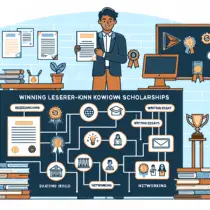Unique Approaches to Writing Personal Statements for Scholarship Essays
Writing a personal statement for a scholarship can seem daunting. However, by incorporating unique approaches, students can create compelling essays that stand out. This article explores various techniques and strategies to craft an impactful personal statement.
Understanding the Purpose of a Personal Statement
A personal statement serves as a reflection of a student’s goals, experiences, and qualifications. It offers an opportunity to illustrate one’s personality, achievements, and aspirations to the scholarship committee. The objective is not only to demonstrate eligibility but also to showcase individuality.
Starting with a Strong Hook
The first few sentences of a personal statement are crucial. Starting with a compelling hook can grab the reader’s attention. This could be an interesting anecdote, a thought-provoking question, or a powerful quote. An engaging introduction sets the tone and encourages the committee to read further.
Leveraging Storytelling
Storytelling transforms a mundane list of achievements into a captivating narrative. Instead of merely stating accomplishments, students can describe the journey behind them. This includes challenges faced, lessons learned, and moments of triumph. A well-told story can make the personal statement memorable.
Demonstrating Passion and Commitment
Scholarship committees look for candidates who are passionate and dedicated. Students should highlight their enthusiasm for their chosen field and their commitment to making a difference. This can be illustrated through involvement in relevant activities, projects, or community service.
Tailoring Content to the Scholarship’s Values
Different scholarships have varying criteria and values. It is essential to tailor the personal statement to align with the scholarship’s mission. Students should research the scholarship provider’s goals and emphasize qualities and experiences that match those values.
Showcasing Unique Experiences
Unique experiences set applicants apart. Whether it’s international travel, overcoming personal hardships, or launching a startup, these experiences can add depth to a personal statement. Such elements make the essay distinctive and demonstrate the candidate’s resilience and resourcefulness.
Reflecting on Personal Growth
Reflection is a powerful tool in personal statements. Students should not only describe their experiences but also reflect on how these experiences have shaped them. Discussing personal growth and self-discovery adds introspection and insight, showing maturity and self-awareness.
Highlighting Academic and Extracurricular Achievements
While personal statements should go beyond simple lists, it is important to highlight significant academic and extracurricular achievements. These accomplishments provide evidence of a student’s potential and dedication. Achievements should be woven into the broader narrative, illustrating how they contribute to the student’s goals.
Establishing a Clear Future Vision
Scholarship committees want to invest in candidates with a clear vision for the future. Students should outline their short-term and long-term goals, explaining how the scholarship will help them achieve these aspirations. A well-defined plan indicates focus and ambition.
Being Honest and Authentic
Authenticity resonates with readers. Students should be honest about their experiences and avoid exaggeration. Genuine narratives are more relatable and credible. Authenticity also involves staying true to one’s voice and style rather than trying to mimic what is presumed to be “ideal.”
Seeking Feedback
Writing a personal statement is not a solitary endeavor. Seeking feedback from teachers, advisors, or mentors can provide valuable insights. They can offer constructive criticism and help polish the essay. Multiple revisions usually result in a more refined and impactful personal statement.
Practicing Good Writing Techniques
Good writing is fundamental to an effective personal statement. This includes clear and concise language, proper grammar, and logical flow. Students should avoid jargon and overly complex sentences, aiming for readability and coherence.
Using Specific Examples
Specific examples make a personal statement more compelling and believable. Instead of general statements like "I am hardworking," students should provide concrete examples that demonstrate their hard work, such as balancing a part-time job while maintaining high grades.
Incorporating a Theme
A unifying theme can give the personal statement coherence and focus. This theme could revolve around a core value, a critical experience, or a central passion. A consistent theme helps tie together different elements of the essay, making it more cohesive and engaging.
Addressing Potential Weaknesses
If there are any potential weaknesses in an application, addressing them candidly in the personal statement can be beneficial. This might include explaining gaps in education, lower grades, or personal challenges. Acknowledging weaknesses and showing how they were overcome demonstrates resilience.
Keeping the Reader in Mind
Understanding the reader’s perspective is crucial. Scholarship committees read numerous essays, so clarity and engagement are vital. Students should aim to make their personal statements interesting and easy to follow, providing the committee with a pleasant reading experience.
Emphasizing Impact and Contribution
Scholarship committees are interested in candidates who will make a positive impact. Students should emphasize how they have contributed to their community, school, or field of interest. Future ambitions to contribute further can also be a compelling part of the personal statement.
Structuring the Essay Properly
A well-structured essay enhances readability. Students should ensure their personal statements have a clear introduction, body, and conclusion. Paragraphs should be logically organized, each contributing to the overall narrative.
Avoiding Clichés
Clichés can make a personal statement feel generic. Students should strive to be original in their expressions and ideas. Personal experiences and unique insights are always more compelling than overused phrases and concepts.
Proofreading Thoroughly
Thorough proofreading is essential to avoid errors that can detract from the quality of the personal statement. Spelling mistakes, grammatical errors, and awkward sentences should be corrected. Reading the essay aloud can help identify issues that might be missed when reading silently.
Balancing Professionalism and Personality
While it’s important to be professional, injecting personality into the personal statement makes it more relatable. Students should balance formal tone with a personal touch, ensuring the essay is both polished and engaging.
Utilizing Active Voice
Using active voice makes the writing more dynamic and vigorous. It clarifies who is taking action and strengthens the connection between experiences and the student. Active voice can help convey confidence and directness.
Avoiding Plagiarism
Originality is crucial. Students must ensure their personal statements are their own work. Plagiarizing or heavily borrowing from other sources not only risks disqualification but also undermines authenticity. Each personal statement should be a genuine representation of the individual.
Concluding with Impact
A strong conclusion reinforces the essay’s main points and leaves a lasting impression. Students should summarize their key attributes and reiterate their aspirations, ending on a hopeful and motivated note. A memorable conclusion can linger in the reader’s mind.
Time Management
Starting the personal statement early allows time for reflection, writing, revising, and seeking feedback. Rushing the process can lead to a less thoughtful and polished essay. Good time management ensures a comprehensive and well-crafted personal statement.
Conclusion
Writing a personal statement for a scholarship essay requires creativity, introspection, and craftsmanship. By employing unique approaches such as storytelling, showcasing personal growth, and demonstrating commitment, students can create impactful essays. Tailoring the content to the scholarship’s values and balancing professionalism with personality can further enhance the personal statement. Ultimately, a well-written personal statement not only exemplifies a student’s qualifications but also their unique journey and aspirations.






